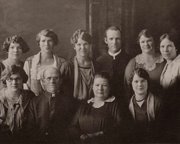The imagery in this recent music video from the heavy metal rock band W.A.S.P. -- "Babylon's Burning" -- includes scenes of Saddam Hussein and the Iraq War, interposed with scenes of vicious dictators of recent history, including Adolf Hitler, Joseph Stalin, Chairman Mao and Iran's Mahmoud Ahmadinejad, suggesting (correctly) that the beast of John's book of the Revelation is satanic power embodied in a super-evil, blood-thirsty tyrant bent on world domination through the power of a totalitarian-militaristic secular government.
"Babylon's Burning" here then is a specific reference to the Mystery Babylon of Revelation chapters 17 and 18, which "in one day (is) burned up with fire" (Rev. 18:8) by the beast with seven heads and ten horns, a visual metaphor for "seven kings, five who have fallen, one who is (at the time of John's writing), and another who has not yet come", (Rev. 17:10), a clear reference to the caesars of ancient Rome.
As John writes, "the beast is himself also an eighth (caesar), like the seven (before him), and the ten horns are ten kings who have not yet attained a kingdom, but will receive authority as kings with the beast (for a little while), and they give their power and authority to the beast", (Rev 17:10-12). This all, of course, happens in the "end times", and the "Babylon" that burns is "the great city that reigns over the kings of the earth" (Rev. 17:18). And she dominates the rest of the world through her vast and insatiable consumeristic wealth, making "all who had ships at sea rich by her wealth" (18:19) by buying their cargoes of every kind of commodity.
But before John ever wrote of Mystery Babylon -- an unknown dominant and wealthy city/nation of the future -- burning in torment, Jeremiah had written of literal Babylon, the land of the Chaldeans, whose cities would burn, and calamity strike until she became "a perpetual desolation" (Jer. 51:62).
And so the video, while specifically addressing a future Babylon, becomes a harbinger of the first Babylon and its destruction by fire, as a judgment upon the evil it has done, for "Babylon is to fall for the slain of Israel" (Jer. 51:49).
NOTE: My embed of W.A.S.P.s video is in no way an endorsement of their music or stage act. My personal opinion is that they got the prophetic figurative interpretations right because they are themselves the contemporary musical prophets of the very beast they sing about.
Labels: Judgment 4 - Burning


